|
|
|
Sort Order |
|
|
|
Items / Page
|
|
|
|
|
|
|
| Srl | Item |
| 1 |
ID:
107214
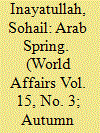

|
|
|
| 2 |
ID:
129087
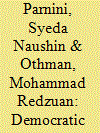

|
|
|
|
|
| Publication |
2014.
|
| Summary/Abstract |
In recent years efforts have been made to improve governance by ensuring institutional performance and policing for greater transparency to sustain liberal democracy in Bangladesh and elsewhere. Since gaining independence in 1971, The People's Republic of Bangladesh has been driven by internal power struggles and economic chaos, while attempting to develop a democratic society. A predominately Islamic country, Bangladesh's representative government is battling poverty and rampant corruption. Although this study appreciates what Bangladesh has achieved so far, it seeks to deviate from the general trend that romanticizes Bangladesh's democracy and its recent connection with new governance parameters. This study attempts to identify some of the major paradoxes that Bangladesh's democracy is faced with. All these factors will be analyzed in the context of a contemporary notion of governance and democracy in Bangladesh.
|
|
|
|
|
|
|
|
|
|
|
|
|
|
|
|
| 3 |
ID:
133625
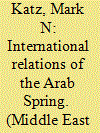

|
|
|
|
|
| Publication |
2014.
|
| Summary/Abstract |
Revolution does not just change things inside one country. It can disrupt international relationships throughout an entire region or even the world. What impact have the "Arab Spring" revolutions had on the international relations of the countries experiencing them, the Middle East, and the world? Have these upheavals been as disruptive of international relations as other revolutions? It will be argued here that, unlike what would occur if revolution succeeded in Syria or Bahrain, the Arab Spring revolutions that have succeeded in Tunisia, Egypt, Libya and Yemen have had a remarkably nondisruptive impact on international relations. To understand just how remarkable this is, though, something needs to be said about just how much revolution has disrupted international relations in the past.
|
|
|
|
|
|
|
|
|
|
|
|
|
|
|
|
| 4 |
ID:
129667
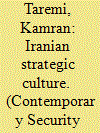

|
|
|
|
|
| Publication |
2014.
|
| Summary/Abstract |
This article attempts to deepen our understanding of how state ideology, as a component of strategic culture, influences the manner in which states approach the use of violence. In that context, it examines the influence of Shiite Islam on the way that post-revolutionary Iran has employed force in its own defence. It argues that the influence of religion on Iranian strategic culture has been extensive. Islam has largely shaped the regime's perceptions of international relations, as well as how Iran should relate to the outside world. It has resulted in a highly revisionist foreign policy which attempts to remake the world in its own image. This orientation has left Iran internationally isolated and driven it to rely as far as possible on its own resources for its defence. It has also inclined Iran to forge closer relations with Islamic movements in the Middle East to compensate for the lack of allies among states. Islam has also prompted the regime to adopt deterrence by denial as the cornerstone of its military strategy. This military strategy renounces the use of force for material gain and condones it only when employed for the defence of the homeland and the wider Muslim community. However, it is still willing to strike pre-emptively if need be and take the fight to the enemy should Iran be attacked. Islam has also led Iran to emphasize faith and fighting spirit, over numbers and technology as the determining factors in war because it perceives victory as a divine gift bestowed on those who fight for Allah.
|
|
|
|
|
|
|
|
|
|
|
|
|
|
|
|
| 5 |
ID:
133628
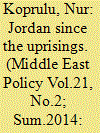

|
|
|
|
|
| Publication |
2014.
|
| Summary/Abstract |
The Islamist movement - in particular the Muslim Brotherhood - has begun to be seen as one of the main beneficiaries of the uprisings in the post-2011 Middle East. The Islamist group's support for public rallies (especially in Egypt, Tunisia and Syria) epitomizes a new era of challenge for the incumbent Arab regimes. Although it is too early to speak of structural change or a revolutionary era in the region, the events of the Arab Spring have highlighted the profound effect the Muslim Brotherhood Society (Jamaat al-Ikhwan al Muslimin) is having in most Middle Eastern countries.
|
|
|
|
|
|
|
|
|
|
|
|
|
|
|
|
| 6 |
ID:
128214
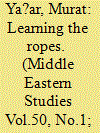

|
|
|
|
|
| Publication |
2014.
|
| Summary/Abstract |
This article analyses the topoi of the Young Turk reading of the 1905 Russian Revolution. It argues that the Young Turks considered the 1905 Revolution as a victory against autocratic regimes and as an edificatory example for the Ottoman constitutionalists. This example provided the Young Turks with a mirror in which they saw a model of revolution from below. As such, in addition to encouraging the Young Turks to formulate and re-assess their methods and means of establishing a constitutional regime in the Ottoman Empire, the 1905 Revolution helped them to transform their initially intellectual movement to an effectual political one.
|
|
|
|
|
|
|
|
|
|
|
|
|
|
|
|
| 7 |
ID:
131787
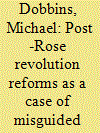

|
|
|
|
|
| Publication |
2014.
|
| Summary/Abstract |
This article traces political and institutional developments in the Republic of Georgia after the Rose Revolution. Particular focus is placed on efforts by Georgian policy-makers to align Georgian political institutions with Western models. Drawing on the concept of policy transfer, the author demonstrates various pitfalls in this process. Based on the gathered evidence, it appears that Georgian policy-makers engaged in various processes of 'incomplete transfer', compounded by a lack of understanding or deliberately false conceptions of Western institutions. Despite democratic rhetoric and interlinkages with the West, Georgia moved to a novel form of 'hyper-presidentialism' and dismantled institutional checks and balances. Hence, the Rose Revolution initially served to reinforce the already existing institutions of 'patronal presidentialism' through a series of misguided institutional modifications. The author also discusses the outcome of the recent parliamentary and presidential elections, which may have ironically and accidentally further democratised the country.
|
|
|
|
|
|
|
|
|
|
|
|
|
|
|
|
| 8 |
ID:
110144
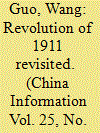

|
|
|
|
|
| Publication |
2011.
|
| Summary/Abstract |
Reviewing the last decade of Chinese-language scholarship on the 1911 Revolution, this article suggests that we should view the Revolution in richer ways, rather than simply focusing on the political event on 10 October 1911. By contextualizing the revolution in its world, this article argues that it is necessary to view 1911 in its own terms and in global perspective in order to articulate historical continuities and discontinuities beyond 1911. How did, does, and will the spirit of modern revolution function and reshape the mental landscape in China's past, present, and future? The revolution is considered here to be not only a transhistorical source of transformation but also part of the restructuring of social life and ideals. Revolution has become the ontological ground of China's modern society. The meaning of the spirit of revolution lay in providing the Chinese people with a space of hope, where they could transcend current disappointment and discontent, and pursue political, economic, and cultural visions to fundamentally change their world. For individuals, revolution offered a means of meeting personal needs; for the nation, the revolution has meant the unending pursuit of 'standing up, enriching up, and strengthening up'.
|
|
|
|
|
|
|
|
|
|
|
|
|
|
|
|
| 9 |
ID:
130218
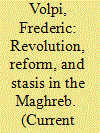

|
|
|
|
|
| Publication |
2014.
|
| Summary/Abstract |
The political situation in the Maghreb in the first decade of the twenty-first century presented a vivid image of enforced stability under authoritarian regimes that gave hardly any hint of changing in the short to medium term. The Moroccan monarchy had successfully engineered a fragmented and ineffective political system that was not posing any concrete challenge to its rule. The military-backed Algerian regime had restored the effectiveness of its institutional apparatus through a combination of repression, diversion of oil rents, and divide-and-rule political tactics. The regime of President Zine el-Abidine Ben Ali in Tunisia had effectively turned into a police state that did not let any kind of organized opposition challenge the established authoritarian "pact." (In Tunisia, this implicit understanding amounted to stability, provision of state services, and opportunities for personal advancement in exchange for political quiescence.)
|
|
|
|
|
|
|
|
|
|
|
|
|
|
|
|
| 10 |
ID:
129446
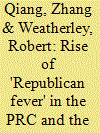

|
|
|
|
|
| Publication |
2013.
|
| Summary/Abstract |
This article examines the upsurge in Chinese public support for the legacy of the Republican era, a phenomenon known as 'Republican fever'. The fever has arisen following the formal relaxation of restrictions on discussing the Republican period. The rationale for doing so is linked to political expediency and in particular to the CCP's quest for nationalist legitimacy. By acknowledging the positive aspects of the Republican era as part of a placatory policy on reunification with Taiwan, the CCP is trying to present itself as a key partner in a united patriotic front with the Kuomintang. But things have not turned out as planned. As Republican fever has spread across a diverse section of Chinese society, so too has criticism of the CCP's record in power. In light of this, we argue that instead of fortifying the Party's nationalist legitimacy, the CCP has unwittingly started a process which appears to be eroding that legitimacy.
|
|
|
|
|
|
|
|
|
|
|
|
|
|
|
|
| 11 |
ID:
129464
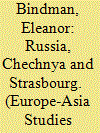

|
|
|
|
|
| Publication |
2013.
|
| Summary/Abstract |
This article explores contemporary Russian official and media discourse on cases concerning human rights violations in Chechnya which have been heard at the European Court of Human Rights. By comparing and contrasting the discourses on the Court's rulings which have been reproduced by various government representatives and various Russian newspapers, the article aims to demonstrate that, while official discourse remains critical of the Court's work with regard to Chechnya, reporting of such cases provides certain media outlets with the opportunity to criticise the government for its perceived failings in relation to safeguarding Chechnya's civilian population from human rights abuses.
|
|
|
|
|
|
|
|
|
|
|
|
|
|
|
|
| 12 |
ID:
127817
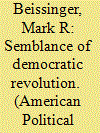

|
|
|
|
|
| Publication |
2013.
|
| Summary/Abstract |
Using two unusual surveys, this study analyzes participation in the 2004 Orange Revolution in Ukraine, comparing participants with revolution supporters, opponents, counter-revolutionaries, and the apathetic/inactive. As the analysis shows, most revolutionaries were weakly committed to the revolution's democratic master narrative, and the revolution's spectacular mobilizational success was largely due to its mobilization of cultural cleavages and symbolic capital to construct a negative coalition across diverse policy groupings. A contrast is drawn between urban civic revolutions like the Orange Revolution and protracted peasant revolutions. The strategies associated with these revolutionary models affect the roles of revolutionary organization and selective incentives and the character of revolutionary coalitions. As the comparison suggests, postrevolutionary instability may be built into urban civic revolutions due to their reliance on a rapidly convened negative coalition of hundreds of thousands, distinguished by fractured elites, lack of consensus over fundamental policy issues, and weak commitment to democratic ends.
|
|
|
|
|
|
|
|
|
|
|
|
|
|
|
|
| 13 |
ID:
029494
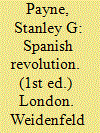

|
|
|
|
|
| Edition |
1st ed.
|
| Publication |
London, WeidenFeld and Nicolson, 1970.
|
| Description |
398p.Pbk
|
| Series |
Revolutions in the Modern World
|
| Standard Number |
297001272
|
|
|
|
|
|
|
|
|
|
|
|
Copies: C:1/I:0,R:0,Q:0
Circulation
| Accession# | Call# | Current Location | Status | Policy | Location |
| 005798 | 946.08/PAY 005798 | Main | On Shelf | General | |
|
|
|
|
| 14 |
ID:
132701
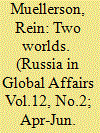

|
|
|
|
|
| Publication |
2014.
|
| Summary/Abstract |
International law doesn't work well in in a world with unipolar tendencies and when its interpretation is dictated from a unipolar center. But the world is simply too big, complex and diverse for that.
There are many causes of the current conflict in and around Ukraine. Due to the presence of all-pervading corruption that since 1991 has constantly increased from President to President, from administration to administration, and the absence of any meaningful efforts to bridge the potentially explosive historical, religious, ethnic and geographic divides of the country, Ukraine was on the edge of becoming a failed state even before it finally exploded on the Maidan. Neither the Ukrainian political elite nor those external actors, which have supported or continue to support the respective governments or oppositions, have ever acted in the best interests of the Ukrainian people as a whole.
|
|
|
|
|
|
|
|
|
|
|
|
|
|
|
|
| 15 |
ID:
133866
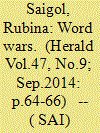

|
|
|
|
|
| Publication |
2014.
|
| Summary/Abstract |
A political idiom soaked in blood will only lead to bloodletting khan directly threatened policemen that he would hang them personally if they tried to stop his Azadi marchers in any way. The violent imagery continued with threats to drag with prime minister out of his house to throw him at the mercy of the marchers. Both the cleric and the ex-cricketer seemed almost disappointed that they were unable to draw blood to give impetus to their movements.
|
|
|
|
|
|
|
|
|
|
|
|
|
|
|
|
|
|
|
|
|